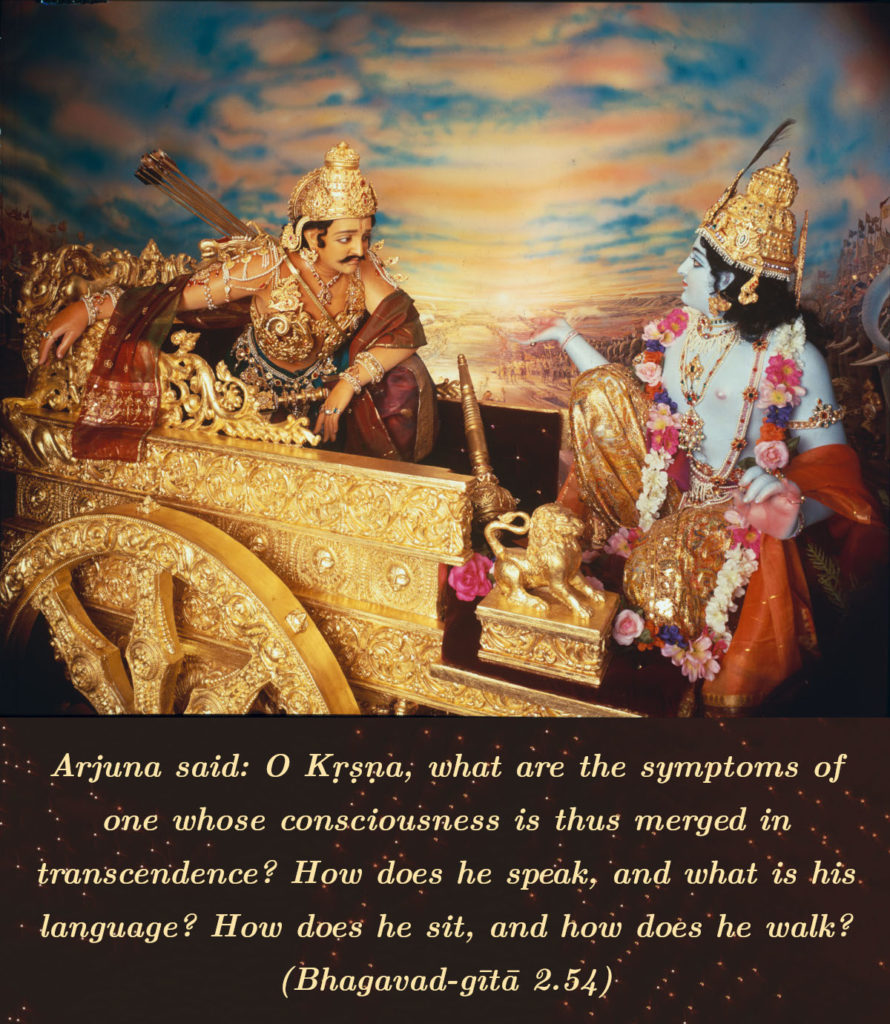अर्जुन उवाच |
स्थितप्रज्ञस्य का भाषा समाधिस्थस्य केशव |
स्थितधी: किं प्रभाषेत किमासीत व्रजेत किम् || 54||
arjuna uvācha
sthita-prajñasya kā bhāṣhā samādhi-sthasya keśhava
sthita-dhīḥ kiṁ prabhāṣheta kim āsīta vrajeta kim
arjunaḥ uvācha—Arjun said; sthita-prajñasya—one with steady intellect; kā—what; bhāṣhā—talk; samādhi-sthasya—situated in divine consciousness; keśhava—Shree Krishna, killer of the Keshi Demon; sthita-dhīḥ—enlightened person; kim—what; prabhāṣheta—talks; kim—how; āsīta—sits; vrajeta—walks; kim—how
Translation:
Arjuna said: O Krishna! What are the characteristics of a man of steady wisdom? How does the man merged in the super-conscious state, sit and move?
Commentary:
Arjuna was anxious to know the characteristics of the man of steady wisdom, the man of self-realisation, the Jivanmukta. It is possible for a man to appear outwardly to be in a state of samadhi. But that is only self-deception and deception of the world. We should be able rightly to know whether a person is really a Jivanmukta or not. Arjuna asks the Lord to describe the characteristics of the Jivanmukta so that he could understand who they are and how they live. Of course, man’s character is reflected in his speech and action. The ignorant man is discovered by his tamasic and rajasic qualities and the impurity of his life and work. In the life of jivanmukta, we find peace and purity, divinity and blessedness. So if one observes, and keeps company with a jivanmukta, he would be able to reform his life accordingly and rise above delusion and ignorance.
Man of steady wisdom and steady intellect (sthitapragnah): These are men of steady wisdom and knowledge (i.e.) men whose mind is firmly established in Atma. The others are of unsteady and infirm wisdom. Their intellect is not purified, nor are their minds rooted in the Self. They are attached to the material world. So the aspirant should follow the footsteps of the sthitaprajna and attain the higher status of spiritual illumination by modeling his life accordingly.
This part of the Gita – from 54 to 72 verses describing the qualities of the sthitaprajna is very important. Mahatma Gandhi used to recite these verses as a spiritual discipline and he has practically acquired that state of steady wisdom by the purity of his discriminative intellect, by his surrender to God, and by his nishkama-karma.
